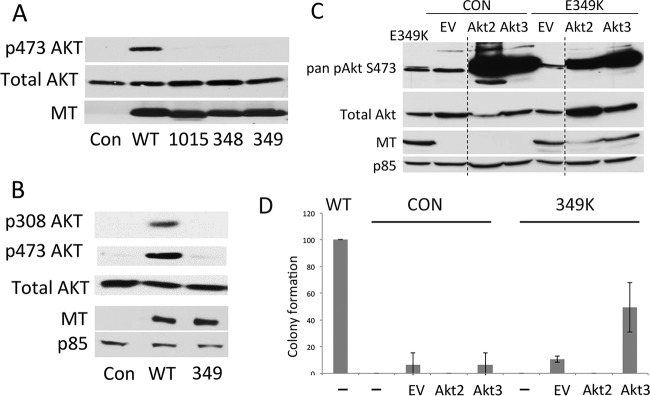FIG 7.
The wild-type MT, but not dl1015, W348R, or E349K MT, activates Akt. (A) Control NIH/3T3 cells or lines stably expressing either wild-type or mutant MT were grown under serum-starved conditions for 24 h. Extracts were resolved by PAGE and blotted for pan-serine 473 phosphorylated Akt, total Akt, or MT. (B) E349K MT is defective in both S473 and T308 Akt phosphorylation. Control cells or cells expressing wild-type or E349K MT were treated with doxycycline for 24 h, of which the last 16 h were serum free. Extracts were made and Western blotting was carried out after SDS-PAGE using phosphospecific antibodies for pT308 and pS473 as well as antibody for total Akt and MT. (C) E349K MT does not prevent Akt activation. 3T3 cells stably expressing EGFP (control [CON]) or E349K MT were infected with empty vector (EV) pBABE retrovirus or pBABE retrovirus encoding constitutively activatable Akt2 or Akt3 and selected in puromycin. Cells were induced to express EGFP or E349K MT by exposure to doxycycline for 24 h, the last 16 h of which took place in the absence of serum. Blotting of cell extracts was carried with antibody recognizing S473 phosphorylation, total Akt, PI3K p85 subunit or MT. (D) Activated Akt3 partially restores E349K MT transformation. Cells with or without mutant Akt expression were induced to express EGFP (CON), WT MT, or E349K MT by exposure to doxycycline for 24 h, after which the cells were seeded into soft agar in the continued presence of doxycycline. Colonies were counted after 4 weeks.

